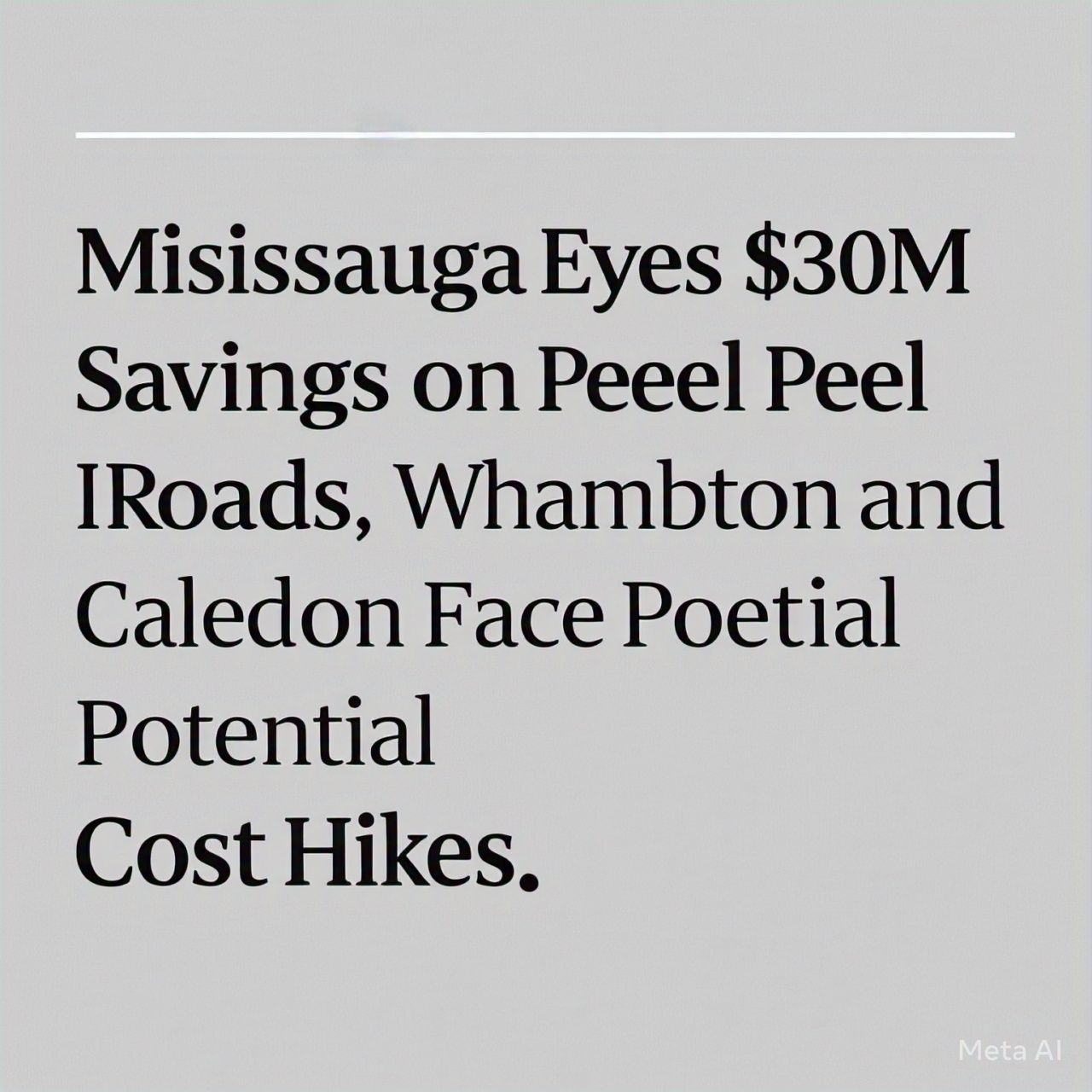Mississauga, Brampton, and Caledon may be heading toward a financial clash over regional road maintenance costs.
City officials in Mississauga are projecting potential savings of approximately $30.7 million if the province transitions the ownership and management of regionally maintained roads to Peel’s lower-tier municipalities. This idea, outlined in a recent presentation to city council, suggests that Mississauga could save this sum by shifting the current property assessment-based cost-sharing model to a per-kilometre system.
While Mississauga stands to benefit, the change would lead to a significant cost increase for Brampton and Caledon residents. Under the proposed model, Mississauga taxpayers would see their costs decrease, while Brampton and Caledon could face substantial hikes in road maintenance fees.
Mississauga Mayor Carolyn Parrish argues that the current system unfairly burdens her city’s taxpayers, who she claims are subsidizing the road costs of Brampton and Caledon. “I do believe it’s completely unfair,” Parrish told the Mississauga News, expressing frustration with the existing cost-sharing framework.
The potential shift in road cost allocation could spark further tensions in the ongoing, complex relationship between the three municipalities as they continue to navigate the process of regional restructuring. For years, Mississauga, Brampton, and Caledon have debated how to divide regional services and expenses, especially as the province has pushed for potential restructuring of Peel Region.
Currently, Mississauga contributes nearly 58% of Peel’s highway maintenance budget, despite controlling just 28% of the region’s 1,682 kilometers of roads. Brampton, with 41% of regional roads, and Caledon, which controls 30%, have not carried as much of the financial burden.
If the transition to a per-kilometre cost model is implemented, it would hit Caledon the hardest. The town, which currently contributes about 7% of regional road maintenance costs, would see an estimated increase of $24.8 million. Parrish acknowledges that this change would be difficult for Caledon, predicting higher taxes and possibly delayed road expansion projects. “Their taxes will go up,” she stated. “Mississauga’s taxes will go down as they should.”
For 2025, Peel has set aside $37 million for Brampton’s road maintenance, $60.4 million for Mississauga, and $70.2 million for Caledon. Under the new proposal, Brampton would incur an additional $5.9 million in costs if the per-kilometre model is adopted.
Caledon Mayor Annette Groves has voiced concerns about the potential shift in road costs. She reiterated that the town had been assured by the province that any transition of regional services would ensure that Caledon’s financial interests would be protected. “Since Caledon was asked to join the Region, there was an understanding that the cost of regional services would be shared among the three lower-tier municipalities,” Groves said.
Brampton Mayor Patrick Brown emphasized that any changes to the cost-sharing model should be tailored to the specific needs of each municipality. “We trust that any funding framework reflects the distinct characteristics and requirements of all communities involved,” he stated.
The transfer of responsibility for regional roads and services could be achieved either through a regional council bylaw or through provincial legislative action. Last year, Premier Doug Ford’s government introduced Bill 240, which proposed the transfer of control over regional roads and other services to the lower-tier municipalities. However, the bill stalled after Ford called an election, and it would need to be reintroduced for the plan to proceed.
A spokesperson for the Minister of Municipal Affairs and Housing, Rob Flack, did not respond to questions regarding whether the province still intends to move forward with the transition of Peel’s roads to the local governments or if the per-kilometre model is being considered.
This comes after months of shifting plans and changing ministers overseeing municipal affairs. Initially, the province proposed dissolving Peel and granting Mississauga, Brampton, and Caledon independence to improve efficiency. However, after cost concerns were raised, the provincial government revised its approach, now seeking to transfer control of various regional services, including road maintenance, land-use planning, and waste management, to the municipalities.
In a move to streamline operations, Peel Regional Council recently voted to transfer waste collection responsibilities to Mississauga, Brampton, and Caledon by January 1, 2026. Mississauga will also take over land-use planning responsibilities in 2024. These shifts represent part of the broader reorganization of Peel’s services as the region evolves.

Leave a Reply